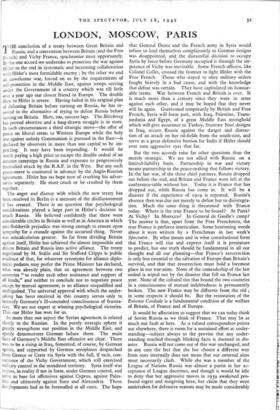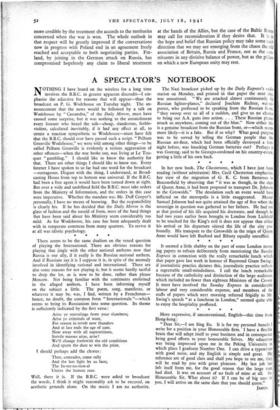LONDON, MOSCOW, PARIS
1 HE conclusion of a treaty between Great Britain and Russia, and a convention between Britain (and the Free French) and Vichy France, synchronise most opportunely. By the one accord we undertake to prosecute the war against Hitler to the end in systematic and increasing collaboration with Hitler's most formidable enemy ; by the other we end an unwelcome war, forced on us by the requirements of self-protection in the Middle East, against troops serving under the Government of a country which was till little over a year ago our closest friend in Europe. The double blow to Hitler is severe. Having failed in his original plan of defeating Britain before turning on Russia, he has re- sorted to the alternative of trying to defeat Russia before turning on Britain. Here, too, success lags. The Blitzkrieg has proved abortive and a long-drawn struggle is in store. In such circumstances a third strategic move—the offer of peace on liberal terms to Western Europe while the holy war against unholy Communism is pursued in the East—is declared by observers in more than one capital to be im- pending. It may have been impending. It would be worth paying a high price to escape the double ordeal of an autumn campaign in Russia and exposure to progressively intensified attack by the R.A.F. in the West. But any such peace-move is countered in advance by the Anglo-Russian agreement. Hitler has no hope now of crushing his adver- saries separately. He must crush or be crushed by them together.
The anger and dismay with which the new treaty has been received in Berlin is a measure of the disillusionment it has created. There is no question that psychological considerations played a large part in Hitler's decision to attack Russia. He believed confidently that there were considerable circles in Britain as well as in America in which anti-Bolshevik prejudice was strong enough to ensure open sympathy for a crusade against the accursed thing. Never was miscalculation greater. So far from dividing Britain against itself, Hitler has achieved the almost impossible and driven Britain and Russia into active alliance. The treaty negotiated by M. Stalin and Sir Stafford Cripps is public evidence of that, for whatever synonyms for alliance diplo- matic pedants may prefer the Prime Minister has declared, what was already plain, that an agreement between two countries " to render each other assistance and support of all kinds," and neither to conclude nor to negotiate peace except by mutual agreement, is an alliance unqualified and undisguised. The universal approval with which the under- taking has been received in this country serves only to intensify Germany's ill-concealed consciousness of frustra- tion. We are not expert at winning psychological victories. This one Hitler has won for us.
In more than one aspect the Syrian agreement is related closely to the Russian. In the purely strategic sphere it greatly strengthens our position in the Middle East, and openly demonstrates German failure there. The main lines of Germany's Middle East offensive are clear. There was to be a rising in Iraq, fomented, of course, by German agents, and supported by German aeroplanes despatched from Greece or Crete via Syria with the full, if tacit, con- currence of the Vichy Government, which still exercised military control in the mandated territory. Syria itself was to pass, in reality if not in form, under German control, and serve as base for offensives against Cyprus, against Pales- tine and ultimately against Suez and Alexandria. Those developments had to be forestalled at all costs. The hope that General Dentz and the French army in Syria would refuse to lend themselves complaisantly to German designs was disappointed, and the distasteful decision to occupy Syria by force before Germany occupied it through the im- potence of Vichy was inevitable. Some French officers, like Colonel Collet, crossed the frontier to fight Hitler with the Free French. Those who stayed to obey military orders fought bravely in a bad cause, and with the knowledge that defeat was certain. They have capitulated on honour- able terms. War between French and British is over. It is much more than a century since they were in arms against each other, and it may be hoped that they never will be again. Garrisoned temporarily by British and Free French, Syria will form part, with Iraq, Palestine, Trans- jordania and Egypt, of a great Middle East stronghold which will give assurance to Turkey, frustrate Nazi designs in Iraq, secure Russia against the danger and distrac- tion of an attack on her oil-fields from the south-east, and serve as a great defensive bastion for India if Hitler should ever turn aggressive eyes that far.
But the two accords raise far other questions than the merely strategic. We are not allied with Russia on a limited-liability basis. Partnership in war and victory means partnership in the peace-making that follows victory. In the last war, of the three chief partners, Russia dropped out before the end, and Britain and France were left at the conference-table without her. Today it is France that has dropped out, while Russia has come in. It will be a disaster if the experience of 1919 is repeated. Russia's absence then was due not merely to defeat but to disintegra- tion. Much the same thing is threatened with France today. Where is the true France to be found? At Paris? At Vichy? In Morocco? In General de Gaulle's camp? The answer is that, apart from the Free Frenchmen, the true France is perforce inarticulate. Some heartening words about it were written by a Frenchman in last week's Spectator. By what means and in what constitutional form that France will rise and express itself it is premature to predict, but one truth should be fundamental in all our thought and all our planning—that France's resurrection is only less essential to the salvation of Europe than Britain's survival, and that that resurrection must hold a foremost place in our war-aims. None of the comradeship of the last ordeal is wiped out by the disaster that fell on France last year. None of the cultural ties that bound the two countries in a consciousness of mutual indebtedness is permanently broken. The new France may be different from the old ; in some respects it should be. But the restoration of the Entente Cordiale is a fundamental condition of the welfare of Britain, of France and of Europe.
It would be affectation to suggest that we can today think of Soviet Russia as we think of France. That may be as much our fault as hers. As a valued correspondent points out elsewhere, there is room for a sustained effort at under- standing—subject always to the proviso that any under- standing reached through blinking facts is doomed to dis- aster. Russia will not come out of this war unchanged, and in any case the fact that she has chosen a different way from ours internally does not mean that our external aims must necessarily clash. While she was a member of the League of Nations Russia was almost a purist in her ac- ceptance of League doctrines, and though it would be idle to deny that her aggressive moves in 1939 awakened pro- found regret and misgiving here, her claim that they were undertaken for defensive reasons may be made considerably more credible by the treatment she accords to the territories concerned when the war is won. The whole outlook in that respect will be greatly improved if the conversations now in progress with Poland end in an agreement freely reached and acceptable to both negotiating parties. Fin- land, by joining in the German attack on Russia, has compromised hopelessly any claim to liberal treatment at the hands of the Allies, but the case of the Baltic Slates may call for reconsideration if they desire that. It is iA the hope and belief that Russian policy may take some uch direction that we may see emerging from the chaos the old association of Britain, Russia and France, not as the con- stituents in any divisive balance of power, but as the pi.larc on which a new European unity may rest.


























 Previous page
Previous page